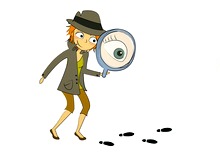| Back to Back Issues Page |
 |
|
English Detective #17, Planning a Sustainable Future: July 16, 2013. July 16, 2013 |
The current investigation (Introducing this issue):
In this issue and the next, we look at sustainability from several very different perspectives. Sustainability is the ability to make something (most often the earth or natural resources) last a long period of time by reusing and renewing resources instead of wasting them. We start with a TED talk by a businessman who decided to change his business from a major polluter to a model of recycling and sustainability. He argues that businesses need to recognize that profits and environmental responsibility are not incompatible. In fact, his business demonstrates that “green” practices can be good business. They increase employee motivation and customer loyalty as well as reducing waste. Then Alex Steffen talks about a number of new ideas that can help people live more sustainably and less wastefully in the “developed world” and solve some pressing problems in developing regions. You can practice vocabulary from these talks with some Conservation Terminology Gap-fill Exercises and a crossword on Social Science Vocabulary. 
Your First Clue: Vocabulary we’ll Emphasize in this Issue
abandon, accommodation, advocate, approximated, attributed, behalf, contradiction, controversy, converted, definite, diminished, exploitation, finite, neutral, panel, regime, statistics, sustainable. Here are a few explanations of vocabulary words that have several meanings or might not be clear in the TED talks, as well as a few related words that are not in those talks. To abandon is to leave someone or something completely behind. When a ship is sinking and cannot be saved, sailors are told to “Abandon ship!” To accommodate means to make room for something (or someone) or to fit it/him/her into a plan or schedule. “We’ll try to accommodate any reasonable request, but placements are limited, so apply early.” Accommodations are places to stay for a short time. They can range from a luxury room or suite of rooms at a 5-star hotel to a bunk (bed) in a barracks or youth hostel, a bed in someone’s home, or a tent. To approximate is to give a number close to but not exactly the same as the actual amount of something. So an approximation is an estimation of numbers or amount. (Sometimes people say “give me a ballpark figure” or “That’s in the ballpark.” This is the same idea, using a metaphor from baseball: a number that is close enough when an exact number is not needed.) There are approximately 7 billion people on earth. In this case the number might be off by millions, but it is close enough to give a general idea of the size of human population, especially when compared to a few generations ago. (In 1800 the approximate world population was 1 billion, then rose to 3 billion by 1960 and 6 billion around 2000. If you are interested, there is a graph showing world population growth, including estimates to 2100, at the beginning of Wikipedia’s article on World Population.) ‘Behalf’ only used in expressions: 'on behalf of' [a name] or 'on [someone's] behalf.' To exploit is to use resources or other people’s services, often in a selfish or wrong way. An exploit,however, is a daring act. (Mark Twain wrote a book about the exploits of his fictional hero Tom Sawyer.) Environmentalists worry about the exploitation of lumber in tropical forests, while social workers worry about the exploitation of child labor. ‘Panel’ has many meanings. Most often it means a group of people who work together to discuss or judge an issue or contest, a thin sheet of wood used with others to cover (‘panel’) a wall, or a surface with electrical switches like an airplane’s control panel. ‘Regime’ comes from the Latin word that means ‘to rule.’ ‘Regime’ usually refers to a government (often a dictatorship or other unpopular ruling party), but it can also be a set of diet and lifestyle rules a doctor prescribes. Getting the whole story: this issue’s reading/listening practice:
Here's the TED talk on sustainable business, and the talk on ideas for the future. Follow the Clues (Vocabulary Practice):
Click here(or right-click to download) for the crossword and here for the answers. The Conservation Terminology Gap-fill is here. Coming in the next issue: Making Sustainability Practical.
P.S. If you’re not already getting English Detective, you can subscribe by completing the form here. (It's free!) |
| Back to Back Issues Page |